- Home
- Elmore Leonard
Cat Chaser Page 2
Cat Chaser Read online
Page 2
* * *
THE FOLLOWING AFTERNOON at the municipal tennis courts, Moran worked his tail off to win two hard sets, hanging in there against a kid with a vicious serve and a red headband who’d try to stare him down whenever Moran called a close shot out of bounds. Moran was only in doubt about his calls a couple of times. He dinked the kid to death with left-handed backspin junk, sliding the kid around on the clay, until the kid threw his racket at the fence and dug out a ten-dollar bill folded to the size of a stamp. Moran said to him, “You’re all right, kid. Keep at it.” He had always wanted to call somebody “kid” and today was the first time.
When he got back to the Coconut Palms there was Nolen Tyner out by the pool with a six-pack.
Jerry Shea, sitting at the office desk with a pile of bills, was whistling as he made entries in the ledger. Moran never knew the songs Jerry whistled. He asked him today, what’s the name of that? And Jerry said, “This Year’s Crop of Kisses.” Jerry was a retired insurance salesman, sixty-seven, who cocked his golf cap to one side, slapped his broken blood vessels with Old Spice and went after lonely widows who’d invite him up to their condominiums for dinner, happy to cook for somebody again, have some fun. Moran pictured withered moth-eaten flanks, or else globs of cellulite getting in the way. Jerry said there was more active poon around than you could shake a stick at. With the fat ones, you rolled them in flour and looked for the wet spot.
Moran said, sitting down, taking off his tennis shoes and socks, “That guy out there drinking beer—”
“Mr. Nolen Tyner,” Jerry said. “Works for Marshall Sisco Investigations, Incorporated, Miami. Actually their office is in Coral Gables.”
“He told you that?”
“Ask a person what they do, they generally tell you,” Jerry said. “Especially since I recognized the address. We used to use Marshall Sisco on insurance investigations from time to time; it’s a good outfit. Nolen says he’s been with them a year, but I think he’s part-time help. Before that played dinner theaters up and down the coast and says he’s been in movies. He was an actor.”
“I think he still is,” Moran said. “He checked in yesterday about two and left at six, didn’t use the room.”
“Well, when he come in today,” Jerry said, “he took it for a week. Number Five. I asked him was he taking some time off and he says well, you could say that. Sort of combining business with pleasure.”
Moran got up and turned to the window to look at Nolen lounging in the shade. The two secretaries from Fort Wayne had their recliners on the cement walk out by the wall, aimed at the sun that soon would be hidden behind the condo next-door, the Aurora. Moran’s gaze moved from their pink corrugated thighs to Number One.
“How about the lovers?”
“They’re in there.” Jerry swiveled around from the desk. “The woman got here first for a change. Then, when the piano player come, Nolen Tyner got up and went over to say something to him. They talked a few minutes, the piano player goes on inside Number One, then comes out again and has another talk with Mr. Tyner.”
“Arguing?”
“I don’t believe so. A lot of nodding, both of ’em, getting along fine. Then the piano player goes back inside and Mr. Tyner returns to his beer.”
“This is a nice quiet place,” Moran said. “I don’t want some husband coming here with a gun.”
“Maybe they’re friends,” Jerry said. “Or she’s a rich woman and Nolen Tyner’s her bodyguard; why he thinks it’s pretty good duty, combining, as he says, business with pleasure.”
“Maybe,” Moran said. “But I better find out.”
He didn’t want to talk to the guy in his sweaty whites, barefoot; it wasn’t his natural image. It reminded him of the country club, standing around in whites in polite conversation, waiters coming out with trays of tall drinks. Moran followed the walk to his bungalow, passing behind the figure reclined in the lounge chair, waved to the two 40-year-old secretaries from Fort Wayne and went inside. He drank a beer while he showered and changed into jeans, a T-shirt and dry tennis shoes, old ones that were worn through and he slipped on without socks. He got a fresh beer from the refrigerator, then on second thought another one and took them, one in each hand, out to the Marshall Sisco investigator lying in the shade.
“You must like the place you sign up for a week.”
Nolen Tyner opened his eyes behind the aviator sunglasses, startled, about to rise, then relaxing again as he saw Moran extending the beer.
“Cold one for you,” Moran said. “Yours must be pretty warm by now.” Four empty cans stood upright on the ground next to the lounge chair with two full ones still in the cardboard casing.
“That’s very kind of you,” Nolen said. He jerked the backrest of the chair up a notch and reached for the can of beer that was beaded with drops of ice water. His sleeve rode up to reveal a bluish tattoo on his right forearm, a two-inch eagle with its wings raised.
While on Moran’s left forearm, also extended, was his faded blue Marine Corps insignia.
They looked at each other. Nolen said, “From the halls of Montezuma, huh?” Smiling, popping open the can of beer.
“And I take it you were airborne,” Moran said. “Not by any chance the Eighty-second?”
“That’s the one.”
“Second or Third Brigade maybe?”
“Third. You’re leading up to something, aren’t you?”
“As a matter of fact,” Moran said. “I wonder if you were in Santo Domingo sixteen years ago. Sitting on the bank of the Ozama River by any chance?”
“Sitting high on the east bank, up on the grain elevators,” Nolen said, smiling some more. “You don’t mean to tell me you were there?”
Moran pulled a recliner over with his foot and sat down, straddling the leg rest, now eye to eye with Nolan. “You had a weapons squad up there, didn’t you? Up on the silos, or whatever they were. With a one-oh-six recoiless rifle?”
“We had a bunch of ’em up there.”
“And one day you’re using your one-oh-six trying to hit a sniper, firing across the river at this one guy. He was in a building the corner of Isabella Catolica and Luperon.”
Nolen raised his eyebrows. “Marines weren’t ever that close to the river. Were they?”
“I got excited,” Moran said. “The heat of the chase.”
“You mean you fucked up,” Nolen said. “Got suckered.”
“The dinger would fire a round, then disappear,” Moran said. “You never knew where you’d get shot at from next.”
“I remember snipers,” Nolen said. “Yeah, and I remember the troopers talking about they took this guy out. Little fucker with an M-one.”
“It was a medium-size fucker with an M-fourteen,” Moran said. “It was me they got. We’re chasing the dinger, I run upstairs, he’s gone. I look out the window and a fifty-caliber racer round nearly took my head off.”
Nolen was nodding again. “Fired from the spotting rifle.”
“I know what it was fired from,” Moran said. “Followed by screaming one-oh-six. I had a mitt I could’ve stuck my hand up and caught it.”
“Didn’t kill you, huh?”
“It took out the back end of the third floor and the stairs. I got hit here, below my flack jacket and down my leg. Fifteen pieces of iron they dug out and gave me a Heart,” Moran said. “So you were Airborne. What’d I bring you a beer for?”
“You felt something, a kinship,” Nolen said, “one grunt sniffing another. I’ll tell you what. Even if it wasn’t me I’ll buy you a drink later on. Make it up to you.”
“I’m going down there next week,” Moran said.
“Where?”
“Santo Domingo.”
“Jesus Christ, what for?”
“Walk my perimeter, see if it looks the same. Stay at the Embajador—we were bivouacked right there. Maybe look up some people. There doesn’t seem to be anything going on; now it’s El Salvador.”
“If there’s any place down th
ere we can go in and fuck things up,” Nolen said, “Reagan and Haig’ll find it, don’t worry.”
“You been back to the D.R. since?”
“I ate that chow just one time and got Trujillo’s Revenge,” Nolen said. “I partied with one girl, one and took home a dose. I take a vacation, man, I go to Las Vegas where everything’s sanitary.”
They took a sip of their beers. Looking at Moran Nolen Tyner said, “Well, well . . .”
“I’m not gonna say it’s a small world,” Moran said, easing back in the recliner to get comfortable, crossing his sneakers, the strings hanging loose.
“You want to know how small it is,” Nolen said, looking across the pool. “You got a couple Dominicans right in that end apartment. The piano player and the broad, the lovers. Though my sheet says the piano player might be Puerto Rican.”
“I thought they might be Cuban,” Moran said, “all the Cubans in Miami. “Your sheet—what do you mean by your sheet?”
“The IDs of people I got under surveillance. The broad, for example. She’s married to a guy by the name of Andres de Boya. Miami big bucks, I mean big.”
“Wait a minute,” Moran said. “The woman in there?”
“They got a house on Biscayne Bay looks like that Polynesian restaurant in Lauderdale, the Mai Kai, only bigger.”
Moran agreed, nodding. “That’s right. But the woman isn’t Mrs. de Boya.”
Nolen gave him a funny look, guarded. “How would you know?”
“Mrs. Andres de Boya’s from the same place I was originally,” Moran said. “Detroit. And she’s no more Dominican than I am. She’s a very nice-looking woman. In fact she’s . . . well, she’s a nice person.”
Nolen was looking at the holes in the toes of Moran’s sneakers, the left one larger than the right. He didn’t seem too sure about Moran.
“Maybe it’s a different de Boya, a relative.”
“How many Andres de Boyas are there?” Moran said. “He was in Trujillo’s government, something like twenty years ago, right up to the time Trujillo got shot on the way to see his girlfriend.”
“Twenty-seven times they hit him,” Nolen said. “A prick like that, I guess you have to be sure.”
Moran was patient. “De Boya came to Miami—I imagine with a few million he’d scored. He was a general in charge of something or other . . .”
“Something or other—try head of the secret police,” Nolen said, “the Cascos Blancos, the white helmets. You’re a poor Dominican you see a guy wearing a liner painted white you run for the fucking hills.”
“I thought he owned sugar mills,” Moran said.
“That’s how he got rich. Trujillo used to pass out sugar mills for good behavior. Three days after the old dictator’s killed, de Boya’s on his yacht bound for Miami. With all the U.S. dollars he could get his hands on.” Nolen was looking at Moran’s sneakers again; his gaze thoughtful, still somewhat skeptical as it raised to Moran’s beach-bum bearded face.
“How do you know him?”
“Leucadendra Country Club. I played golf with him a few times. Actually it was twice,” Moran said, “in the same foursome. That was enough.”
“Too rich for your blood, uh, the bets? Little Nassau?”
“No, the guy cheats,” Moran said. “You believe it? Guy that’s worth, easy, forty fifty million, he cheats on a hundred-dollar round of golf and all the clucks, the guys that play with him, know it. I couldn’t believe it. They not only pay up they go, ‘Gee, Mr. de Boya,’ give him all this shit what a great game he plays.”
Nolen said, “Yeah?” Still a little hesitant. “What about you? You pay him?”
“No, as a matter of fact I didn’t,” Moran said. “My father-in-law at the time, I thought he was gonna have a stroke. ‘You out of your mind? You know who that is, for Christ’s sake?’ I said, ‘Yeah, a guy that cheats. Fuck him.’ My father-in-law goes, ‘A hundred bucks, Christ, I’ll give you the hundred.’ I tried to explain to him that wasn’t the point, but my father-in-law was nervous because de Boya was putting money in his condominium developments and I worked for him, my father-in-law. So he was afraid it would look like he was siding with me, not making me come across. I told him that was too bad, I wasn’t gonna pay any tinhorn hacks his way out of the rough like he’s cutting weeds, three-putts the hole and says he took a five. Bullshit.”
“You belong to Leucadendra?” Nolen’s tone of skepticism was giving way to mild surprise.
“Not anymore,” Moran said. “De Boya tried to get me blackballed. He not only didn’t like the way I played golf, he hinted around I was trying to hit on his wife.”
“Were you?”
“No. I told you, she’s a very nice person. Her name was Mary Delaney, worked for de Boya’s lawyer before they got married.”
“Change her luck and marry a spic, uh, with fifty million. Shit, I’d marry him too.”
“Be careful,” Moran said.
Nolen grinned. “Got a little soft spot there? I won’t say another word.”
“De Boya didn’t get me blackballed,” Moran said, “but it didn’t help my standing at the club any. Then when my wife divorced me for not playing the game, her dad helped give me a shove and there went the club membership. Which was fine, I never liked golf that much anyway.”
“So you were married to bucks, too.”
Moran shrugged. “It might’ve worked, it didn’t, that’s all. The last time I saw de Boya—he came by here about six eight months ago like nothing had happened, like he hardly knew me, and offered to buy the place, build a condominium.”
“What’d you tell him?”
“I turned him down. I got real estate people calling here every week. They’re trying to build a solid wall of condos from Key West to Jacksonville.”
“I won’t ask you the last time you saw his wife.” Nolen grinned to show he was kidding around.
Moran didn’t grin. He said, “Good. We leave her out of this.” He said, “I understand you had a talk with the piano player today.”
“You got eyes even when you’re not here,” Nolen said. “Yeah, actually I felt sorry for him. I told him I had him under surveillance with a woman he wasn’t supposed to be with. Then, before he started to sweat I told him he was perfectly safe, I wasn’t gonna turn him in. Even though I was taking a terrible risk.”
“You made him understand,” Moran said, “the risk ought to be worth something.”
“Like fifty a day. Why not.”
“And you don’t even give ’em clean towels,” Moran said. “What do you do when you’re not hanging out?”
“I rest,” Nolen said. “I got rid of my goals, decided to take it one day at a time. Don’t overdo it, never drink more than a case of beer or a fifth of booze in any given day. Unless there’s a party.”
“I’ve always admired restraint,” Moran said. “Not overreaching your capabilities.”
“There you are,” Nolen said. “I was an actor for twenty years. Well, ten years professionally. Some film work in New York, mostly dinner theater down here. You’re trying to act, the audience’s sitting there trying not to break wind out loud. They want to leave, go home, but not any more’n I do. I played either the lead guy’s buddy or the broad’s brother. You know, just a straight asshole type of guy, wrings his hands a lot, opens his eyes real wide: ‘Gee, Scott, I don’t know if I’d do that.’ Doesn’t ever know what the fuck’s going on. I start playing the guy as a drunk, give the part a little dimension. Or I’d play it, give it just a hint the guy’s homosexual. But the asshole directors on that dinner circuit, to get any respect from them you had to be Forrest Tucker . . . Doug McClure. You know what I mean? That type.”
“I imagine it’s tough,” Moran said, “when you think of all the Doug McClures out there.” He saw Nolen eyeing the two Fort Wayne secretaries, their chairs backed up to the low cement wall, the high-rise shade now up to their knees.
“I’m at a motel in Golden Shores,” Nolen said, looking at Moran again.
“It’s not bad, three bills a month, it’s fairly clean. The thing is, I’d like very much to give you the business—”
“I think you are,” Moran said.
“But even your off-season rate, thirty bucks a day, and you know, come on, that’s not only steep it’s unrealistic. Maybe not for transients, no. But what I’m offering you is the assurance of a permanent tenant.”
“How permanent?”
“What have you got? With the lovers and the secretaries you got about four units out of twelve rented, am I right? And it’s like that I bet eight nine months of the year. Okay. For a fair rate you’ll have guaranteed occupancy of Number Five the year ’round. I’ll even help you out keeping the place up. Skim the pool, cut the grass—”
“We don’t have any grass.”
“Feed the chickens—I don’t know what you do around there. You tell me.”
“Six hundred,” Moran said.
Nolen said, “George, six hundred, I can get a furnished two-bedroom apartment for six hundred.”
“Maybe over at the Seminole Indian Reservation. Not on the beach you can’t.”
“How about three? For old time’s sake, the Dominican Republic,” Nolen said. “I’ll entertain the secretaries, teach ’em how to sit up and roll over. Listen, I’ll even sign a year’s lease.”
And leave in the dead of night, Moran thought. But what would he be out? He liked Nolen. He didn’t trust him especially, but he didn’t have to. Moran said, “Okay, but no smoking in bed. You promise?”
Saturday Nolen Tyner moved into Number Five with everything he owned. Two old suitcases and several cardboard boxes loaded with magazines, letters, glossy photographs of himself in different outfits and poses, a hair dryer. A liquor case that held bottles of scotch, vodka and rum, most of them nearly empty. A lot of clothes, soiled-looking, out-of-style shirts, trousers and sport coats doubled up over bent hangers. A big Northern tissue box of sporty shoes, tan ones and white perforated ones that caught Jerry’s eye and Nolen told him he could have any pair he wanted if they fit. The man’s life was in cardboard boxes he carried from one motel to another.
Jerry left with his shoes and Nolen poured Moran and himself a scotch to mark the occasion.

 Charlie Martz and Other Stories: The Unpublished Stories
Charlie Martz and Other Stories: The Unpublished Stories Elmore Leonard's Western Roundup #2
Elmore Leonard's Western Roundup #2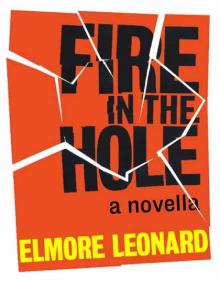 Fire in the Hole
Fire in the Hole Tishomingo Blues (2002)
Tishomingo Blues (2002)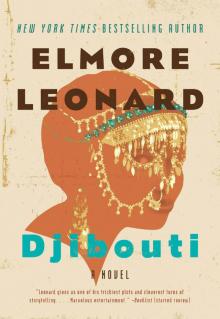 Djibouti
Djibouti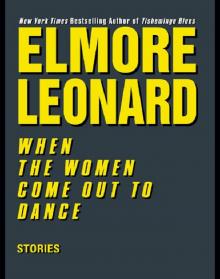 When the Women Come Out to Dance: Stories
When the Women Come Out to Dance: Stories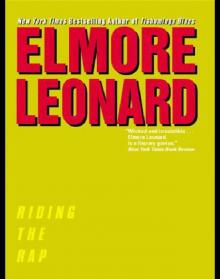 Riding the Rap
Riding the Rap Moment of Vengeance and Other Stories
Moment of Vengeance and Other Stories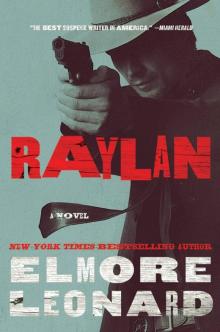 Raylan
Raylan Touch
Touch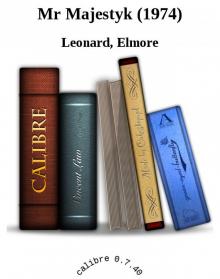 Mr Majestyk
Mr Majestyk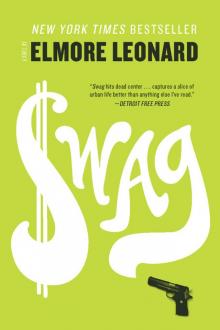 Swag
Swag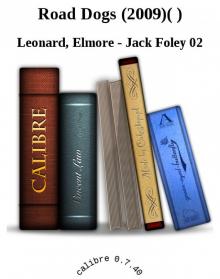 Road Dogs
Road Dogs La Brava
La Brava The Hot Kid
The Hot Kid Valdez Is Coming: A Novel
Valdez Is Coming: A Novel Be Cool
Be Cool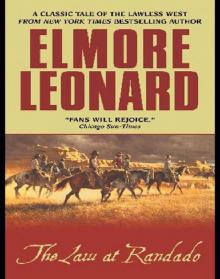 The Law at Randado
The Law at Randado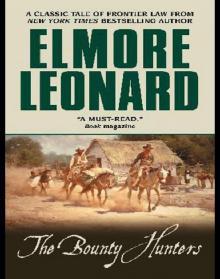 The Bounty Hunters
The Bounty Hunters When the Women Come Out to Dance
When the Women Come Out to Dance 310 to Yuma and Other Stories (1953)
310 to Yuma and Other Stories (1953)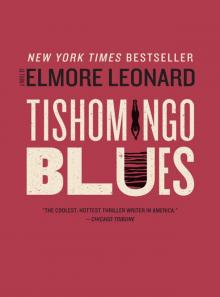 Tishomingo Blues
Tishomingo Blues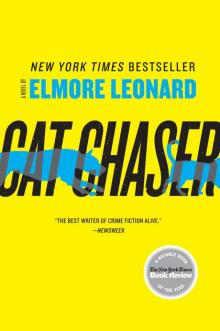 Cat Chaser
Cat Chaser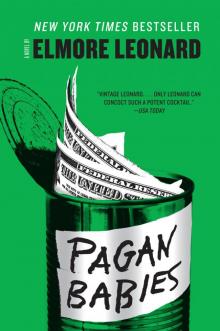 Pagan Babies
Pagan Babies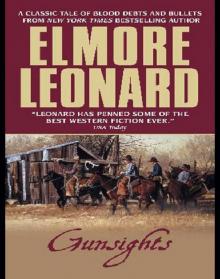 Elmore Leonard's Western Roundup #1
Elmore Leonard's Western Roundup #1 52 Pickup
52 Pickup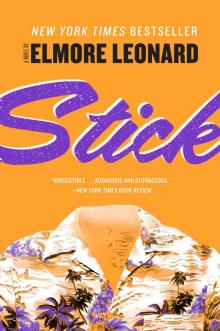 Stick
Stick The Moonshine War
The Moonshine War Valdez Is Coming
Valdez Is Coming City Primeval
City Primeval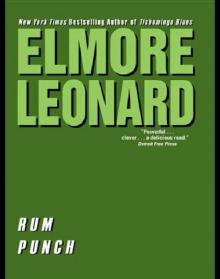 Rum Punch
Rum Punch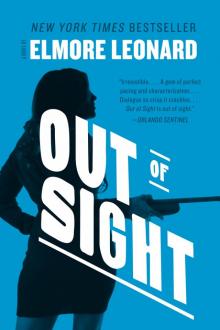 Out of Sight
Out of Sight Naked Came the Manatee (1996)
Naked Came the Manatee (1996)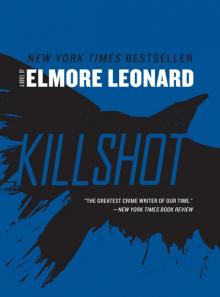 Killshot
Killshot Cuba Libre
Cuba Libre Forty Lashes Less One
Forty Lashes Less One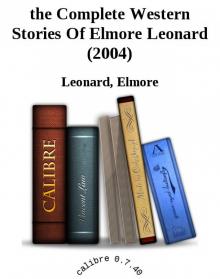 The Complete Western Stories of Elmore Leonard
The Complete Western Stories of Elmore Leonard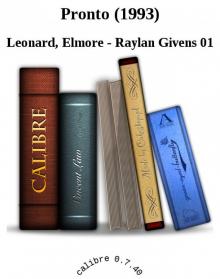 Pronto
Pronto Split Images
Split Images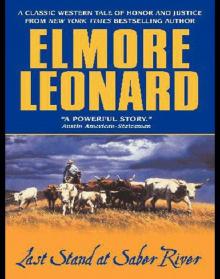 Last Stand at Saber River
Last Stand at Saber River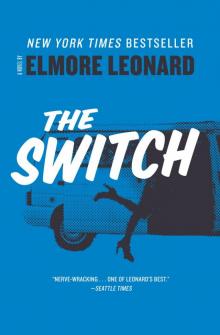 The Switch
The Switch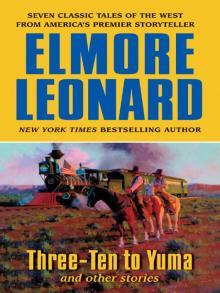 Three-Ten to Yuma and Other Stories
Three-Ten to Yuma and Other Stories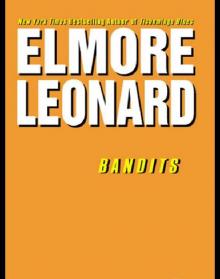 Bandits
Bandits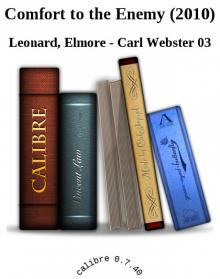 Comfort to the Enemy and Other Carl Webster Stories
Comfort to the Enemy and Other Carl Webster Stories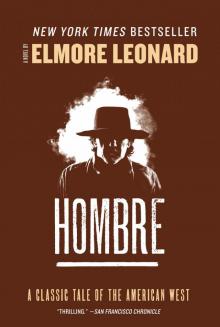 Hombre
Hombre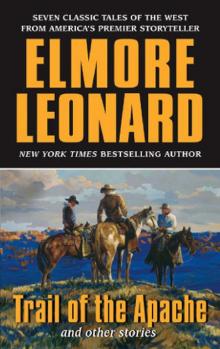 Trail of the Apache and Other Stories
Trail of the Apache and Other Stories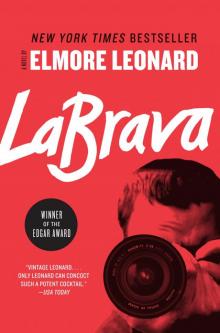 LaBrava
LaBrava Gold Coast
Gold Coast Jackie Brown
Jackie Brown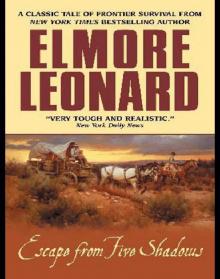 Escape From Five Shadows
Escape From Five Shadows Karen Makes out (1996)
Karen Makes out (1996)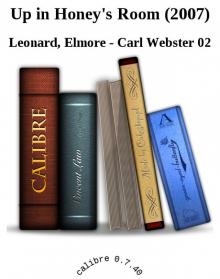 Up in Honey's Room
Up in Honey's Room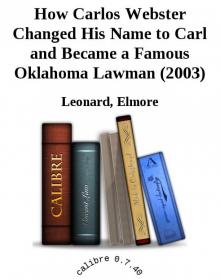 How Carlos Webster Changed His Name to Carl and Became a Famous Oklahoma Lawman (2003)
How Carlos Webster Changed His Name to Carl and Became a Famous Oklahoma Lawman (2003)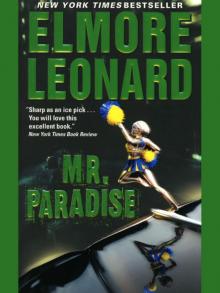 Mr. Paradise
Mr. Paradise The Hunted
The Hunted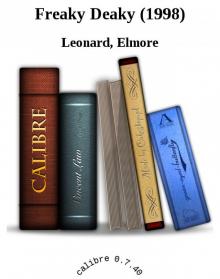 Freaky Deaky
Freaky Deaky Louly and Pretty Boy (Ss)
Louly and Pretty Boy (Ss)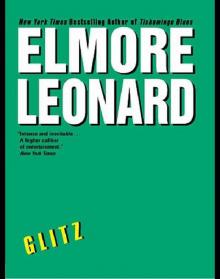 Glitz
Glitz A Coyote's in the House
A Coyote's in the House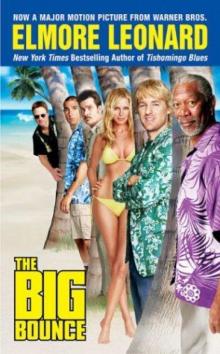 The Big Bounce jr-1
The Big Bounce jr-1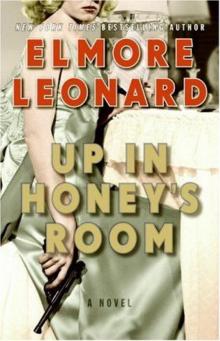 Up in Honey's Room cw-2
Up in Honey's Room cw-2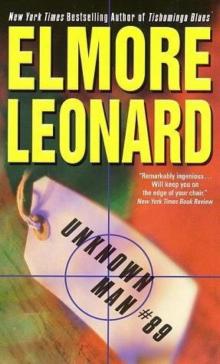 Unknown Man #89 jr-3
Unknown Man #89 jr-3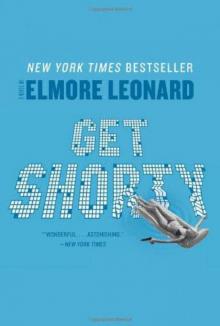 Get Shorty: A Novel cp-1
Get Shorty: A Novel cp-1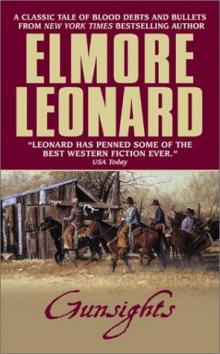 Gunsights
Gunsights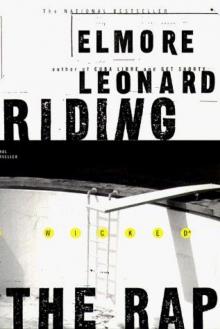 Riding the Rap rg-2
Riding the Rap rg-2